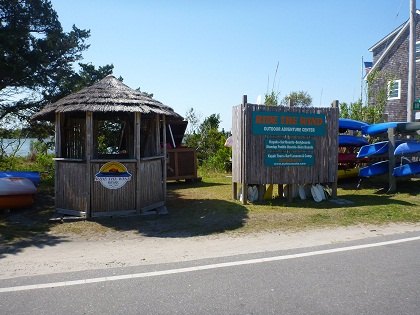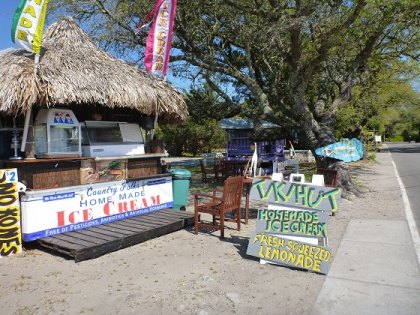Backyard chickens have never been an agenda item, said board member BJ Oelschlegel, who hopes to dispel some persistent rumors. (Nor has Ocracoke Civic and Business Association discussed chickens raised locally for eggs and meat. OCBA has no powers of regulation.)

There is an ongoing discussion of how, if at all, to regulate mobile businesses, and those that operate seasonally from kiosks. At their April 12 meeting, the Ocracoke Planning Board questioned the definition of "structure" in the Ocracoke Development Ordinance.
Pop-ups, such as food trucks and roadside stands, have gone largely unregulated as the board awaits public input. Little has been forthcoming. Three Ocracoke residents attended the April meeting to listen and comment. Five of the six appointed board members were present.
During the public comment period Harborside Motel owner Corky Pentz said, "Right now anything that goes on your property with a footprint is a structure." The language is broad enough that mobile carts, lemonade stands and garage sales would need permitting, he said.
The ODO reads: "Structure means anything constructed or erected, the use of which requires location on the ground, or attachment to something having location on the ground."
"The original ODO was written in a panic mode," after several hotels were built in the early 1980s, said Pentz. "All of a sudden we had two things on the harbor that were five stories."
Board member Keith Parker-Lowe, whose day job is writing technical documents for government agencies, agreed that the original, existing ODO is general. Parker-Lowe is looking into language to help clarify the ordinance.
Should portable businesses and structures be handled separately from permanent ones? asked Parker-Lowe.
"It's obvious what our problem is. If a pop-up is defined as a structure, it falls under the ODO," said board chair Bill Rich.
Structures have mandated setbacks of 8 feet from the property line. Commercial structures must provide two parking spaces for every 200 square feet of floor area. Restaurants are obliged to provide a parking space for every four seats. Residences must provide one parking space for each bedroom. The ODO was enacted in 1986.

Building inspector and ODO enforcement officer Jerry Hardison said that to his knowledge, there has never been an incidence where a residence or business on Ocracoke has been issued a violation for not providing enough parking.
Setback regulations are designed to control fire, density of development, and protect public safety, said board member BJ Oelschlegel. "Should businesses in the yard respect the same right of way as other businesses?" asked Oelschlegel.Everyone recognizes that hot-button issues on Ocracoke can seem personal. Board members Tom Pahl and Oelschlegel cautioned about discussing specific businesses.
"If there's a complaint about it, you shouldn't be afraid to talk about it," said Parker-Lowe. "Ultimately, you have to look at the problem. Not who you're regulating, but why you're regulating," he said. "There is no question [businesses in yards] create problems. How do we regulate fairly?"
The ODO states:
"The purpose of this article is to promote the public health, safety and general welfare by:
(1) Regulating the:
a. Density of population;
b. Size of yards and other open spaces;
c. Height, size and location of buildings and other structures;
(2) To provide for an adequate transportation system; and
(3) To provide for adequate drainage, water supply and sewage disposal."
The ODO and building codes are two separate entities, said Pahl. The ODO can be more, but not less, restrictive than county and state building codes.
As it was originally conceived, the ODO enforcement officer would be a separate position from the building inspector, and the two would communicate with one another, noted Pahl.
"I talk to myself all the time," said Hardison, who fills both roles.
The health department also regulates businesses. Hardison calculates the safe capacity of buildings based on the size of the building and fire safety. Department of Health officer Hugh Watson calculates capacity based on septic and waste water disposal.
Other questions about pop-up businesses, like if they pay sales tax, and if they are fair to established businesses, are outside the purview of the planning board, said Board chair Bill Rich. The tax office is responsible for collecting fees, and fairness "is a marketplace issue," said Rich.
Structures within 100 feet of water also require CAMA permits and those within 50 feet must seek approval from the Division of Water Quality. Pentz said his concession trailer, Harbor Treats, received approval from both offices and also allowed for parking after Hardison pointed out the requirements in the ODO.

"Has anybody other than me noticed there are more signs, and they are getting closer to the road?" said Hardison.
The first line of the ODO regarding signs states, "All commercial signs shall require a permit." It goes on to say that "No sign shall be permitted within ten feet of a road, street, path, way or other such passageway" and "No freestanding sign shall be placed within 50 feet of another freestanding sign on the same lot."
Also, "Location of the sign shall not be in a street right-of-way; Location of the sign shall not obstruct the clear vision at driveways and intersections."
Given the lack of enforcement, and the seeming indifference of the public to the lack of enforcement about both parking and signs, Pahl asked, "Is the existing regulation totally unreasonable considering the burden placed?"
All of the above discussion took place during the public comment period of the meeting. After almost an hour, Rich closed the comment period and asked the board to address the agenda.
A re-draft of the ODO application form was accepted at the last meeting. The new form will be posted to the Hyde website to replace old form.
Board members have submitted suggestions for a 7th member to Commissioner Darlene Styron. They are waiting to hear who she appoints.
County Manager Mazie Smith, acting on behalf of Hyde commissioners, asked the board to recommend a penalty for failing to pass the travel trailer inspection, which the board approved in December. Learn more about the recently enacted travel trailer regulations in this article by Connie Leinbach in the Island Free Press.
"I guarantee you that 90% of this island weren't legally permitted," said Hardison, in regard to approximately 115 travel trailers being used as permanent homes on Ocracoke.
The board decided to recommend that travel trailers must come into compliance within 30 days of a failed inspection, or be asked to cease and desist.
The next planning board meeting is scheduled for 5:30 p.m. on Thursday, May 10, at the Ocracoke Community Center. The board continues to invite public participation and comment.
Click here to read the ODO.